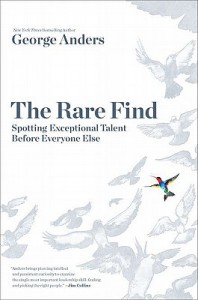Book Review The Rare Find: Spotting Exceptional Talent Before Everyone Else by George Anders
 Skip this book. In summary, here are the author’s 5 basic lessons for hiring talent:
Skip this book. In summary, here are the author’s 5 basic lessons for hiring talent:
- Don’t overlook people with “jagged” resumés. Look instead at the person’s career choices and skills they have learned and instincts they inherently have.
- Search for people who demonstrate resilience and creativity as well as the traditional skills like work ethic and reliability.
- Don’t assume management skills in one area translate to skills in another. Just because a person is a successful manager at a tech company doesn’t mean she will be great at managing a food manufacturer. Companies have different cultures.
- Analyze your current hiring methods and overhaul the ones that have led you to build ineffective work forces in the past. Your cutesy questions of “What is wind?” or “What is education?” may be bringing in the worst candidates.
- Nurture talent and foster a sense of purpose and belonging at the company.
Anders’ writing style is more on the academic rambling tradition than the quick, short, case studies of most pop-business books. The first few chapters were written in an introductory manner that jumps from example to example without as much as a conclusion or major question addressed. I kept turning back the pages to see if I was reading an elongated introduction or actual chapters.
Anders would have served us and the subject better if he had concentrated on just a few great examples per chapter and then followed it with an in-depth analysis of the concept he was trying to teach. Reading this book was like seeing a bunch of movie trailers that were cut down to 15 seconds each – you could see the common themes but the staccato barrage of information is disturbing and ineffective.
One more thing about the cases used in the book: I’d prefer it if Anders didn’t fall into the tired and very annoying cliché of sports analogies, especially when using sport team examples goes against one of his main tenets. Anders cites many sporting examples in the book, but one of the main lessons he purports to convey is that experience from one situation doesn’t necessarily translate into success in another. The spattering of sports examples, the overwhelming use of men’s examples and male-dominated industry cases also turned me off as a reader.
I feel like this book could’ve been great and exceedingly popular amongst very diverse markets if Anders just had a good editor. It seemed like Anders, being Mr. Bigtime Business Writer, intimidated the editor into entertaining his ADHD-like rants.
Anders’ points are valid and I appreciate his message. I wish he’d take this book off the market and sit down and re-write it for a more general audience. The thought of this may turn his stomach, but simplicity would have been the best policy for this subject matter. I fear the rambling quality of the book obscures the worthy lessons therein. It’s such a shame and a staggering disappointment. No change will be brought about by this book, because not enough people will read it and those who do read it will give it up by the third chapter. Sad.
Next time, maybe the publishers will adopt the lessons of the book and instead look to an underdog writer with a diverse background and evidence of passion and insight to write the book instead of a old white guy business writer with lots of New York Times best-seller juice.
They can always call me, of course. 🙂
Did you read The Rare Find? Let me know what you think in the comments.

Comments on this entry are closed.